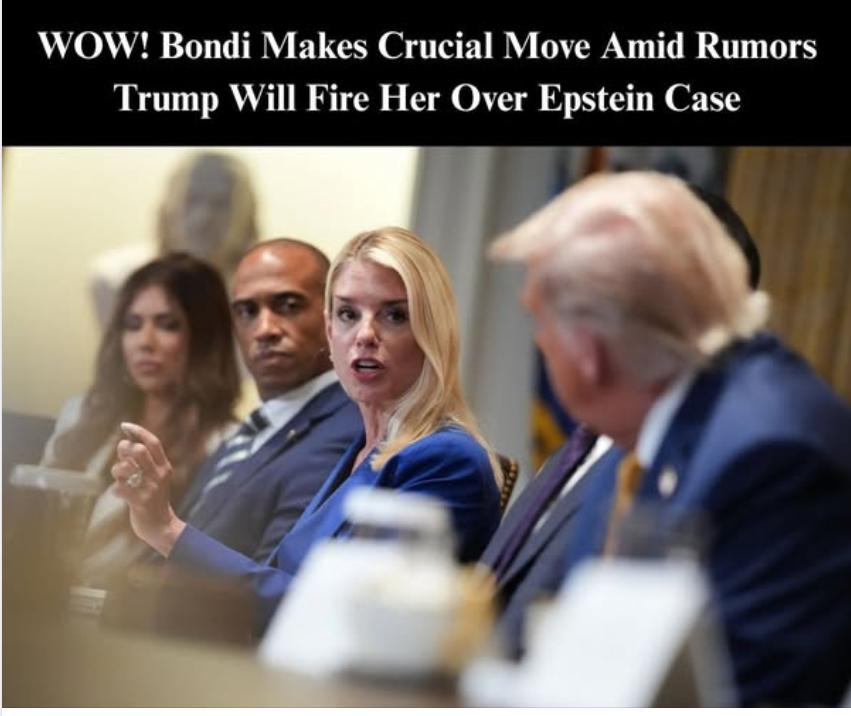
The Purge Within the DOJ: Bondi’s Controversial Dismissals and the Fallout from the January 6 and Trump Investigations
In the past several months, the U.S. Department of Justice (DOJ) has been rocked by a series of firings that have sparked controversy, particularly for their connection to Special Counsel Jack Smith’s investigations into former President Donald Trump. Under the leadership of Attorney General Pam Bondi, more than 35 DOJ employees have been dismissed, including attorneys, support staff, and even U.S. marshals. These dismissals are tied to two highly sensitive investigations: Trump’s involvement in the January 6 Capitol riot and his handling of classified documents.
This purge is not only a significant personnel shift within the DOJ but also a political flashpoint that has generated both internal strife and public scrutiny. Bondi’s actions, justified by her as part of a broader effort to eliminate “political bias” within the department, have raised questions about the politicization of law enforcement and the integrity of ongoing investigations.
The Scope of the Purge: Who Was Fired and Why?
The recent wave of dismissals represents a critical moment in the reshaping of the DOJ’s workforce. According to Axios, as of July 2025, at least 35 people—including attorneys, support staff, and U.S. marshals—who were involved in investigations linked to Trump have been removed from their posts. Many of these employees had volunteered to assist in the high-profile cases under Special Counsel Jack Smith, who is overseeing the prosecution of Trump for his role in the January 6 Capitol riot and the alleged mishandling of classified documents.
These firings are the result of a “weaponization” review initiated by Bondi, who was appointed Attorney General in January 2025. Bondi’s team, notably her Weaponization Working Group, was tasked with identifying DOJ personnel who may have been too politically biased in their handling of Trump-related cases. As part of this effort, employees who were seen as overly aligned with the political prosecution of Trump were targeted for removal.
Bondi’s office has defended the firings as necessary to restore balance and ensure that the DOJ remains free from political influence. In particular, Bondi has justified the purge by claiming that certain DOJ employees had been too eager to pursue politically motivated cases against the former president. These cases, she argues, should be pursued with neutrality and free from partisan bias.
How Many Employees Have Been Affected?
The scale of the purge is staggering. The latest reports suggest that up to 37 DOJ employees could ultimately be dismissed as part of Bondi’s review process. This includes several individuals who were directly involved in the investigations surrounding Trump’s alleged role in the January 6 Capitol attack and the classified documents case. The latest group of firings included nine staff members dismissed in a Friday night round of terminations. Axios later reported that the actual number might have been closer to 20 dismissals in total.
The firings occurred across multiple DOJ offices, including those in Washington D.C., Florida, Virginia, and North Carolina. The purged employees included not only attorneys and investigators but also lower-level staff who had assisted in the prosecution of Trump-related cases.
This development adds to the 14 other employees who had been dismissed in earlier rounds, bringing the total number of fired employees linked to Smith’s investigations to at least 35. The process is ongoing, with an additional 15–17 employees still under review.
Bondi’s Weaponization Working Group: A Political Agenda?
Bondi’s purge is being driven by her Weaponization Working Group, which was established shortly after her appointment as Attorney General. The group’s mandate is to investigate and root out employees who are deemed to be politically aligned with certain investigations—particularly those involving Trump. The group has been tasked with identifying any perceived partisan biases within the DOJ, and the goal, according to Bondi, is to ensure that only non-partisan prosecutors remain at the DOJ.
Critics, however, argue that this working group is a political weapon in itself. The timing of the firings, along with the specific targets selected for dismissal, has raised eyebrows. The fact that many of the employees let go were directly involved in investigating Trump’s actions raises the question of whether Bondi is using her office to further an anti-Trump agenda or protect the former president from legal accountability.
There is also concern that the purge could undermine the integrity of ongoing investigations, especially as several dismissed staffers had been deeply involved in the handling of high-stakes cases related to the January 6 Capitol attack and Trump’s mishandling of classified documents. The firings could potentially disrupt the continuity and expertise required for such complex legal matters.
Internal Conflict: DOJ vs. FBI
The fallout from Bondi’s purges extends beyond the DOJ itself. There has been considerable tension within the DOJ and FBI over the handling of politically sensitive cases. In particular, the public rift between Bondi and FBI Deputy Director Dan Bongino has added fuel to the fire. Bongino, who has been a vocal critic of the FBI’s handling of high-profile investigations into Trump, reportedly had a heated clash with Bondi after her controversial handling of the Epstein files case.
The Epstein files, which were expected to reveal explosive new details about financier Jeffrey Epstein’s sex trafficking ring, ended up producing disappointing findings for many within the MAGA movement. Epstein’s death was ruled a suicide, and the DOJ dismissed any claims about a “client list” implicating high-profile figures. This move infuriated many, including Bongino, who had long promoted Epstein conspiracy theories.
Bongino’s discontent with Bondi’s handling of the Epstein case reportedly led to him taking a day off from work on Friday, with some sources speculating that he might resign from his position. This internal strife highlights the deep divides within the federal law enforcement community and raises questions about the future of DOJ–FBI cooperation on politically sensitive cases.
The Legal and Political Implications of Bondi’s Actions
The mass firings and internal divisions have significant legal and political implications. On the legal side, there is growing concern that the dismissals could amount to a violation of civil service protections for federal employees. The Federal Employee Protection Act (FEPA) provides safeguards against retaliation for employees who report misconduct or participate in lawful investigations. Critics argue that the firing of so many employees linked to Trump-related cases could be seen as a form of retaliation for their work on these investigations.
Politically, the firings represent a clear power struggle within the federal government. The Trump administration had long been accused of politicizing the DOJ and using the department for personal and political gain. Bondi’s purge, critics argue, mirrors these same tactics, particularly as it targets employees who were investigating the former president.
Bondi’s actions also threaten to undermine public confidence in the DOJ’s ability to conduct independent and impartial investigations. With accusations of partisan interference now hanging over the department, many are questioning whether it can continue to operate free from political pressure.
What’s Next?
As the investigation into Trump continues, the fallout from Bondi’s purge is likely to intensify. Bondi’s office has already indicated that more firings are to come, with several additional employees under review. Legal challenges to these firings may also arise, particularly if dismissed employees claim that their terminations were politically motivated or violated their rights under federal law.
Public pressure may mount on the Biden administration to clarify its position on Bondi’s actions and take steps to ensure that the DOJ remains an independent and unbiased institution. The handling of the January 6 cases and classified documents probes could be further complicated by the ongoing political tension within the DOJ and FBI.
Conclusion
The recent wave of firings within the Department of Justice under Attorney General Pam Bondi marks a pivotal moment in the ongoing battle over the Trump investigations. While Bondi has defended the purge as a necessary step to eliminate political bias within the DOJ, critics see it as a politically motivated move aimed at protecting the former president from legal consequences.
With internal divisions between DOJ and FBI officials, and the specter of legal challenges looming, the future of these investigations—and the credibility of the DOJ—hangs in the balance. The actions taken in the coming months will likely determine whether Bondi’s purge strengthens or further erodes public trust in the integrity of the nation’s top law enforcement agencies.


